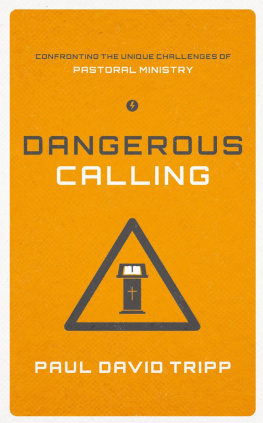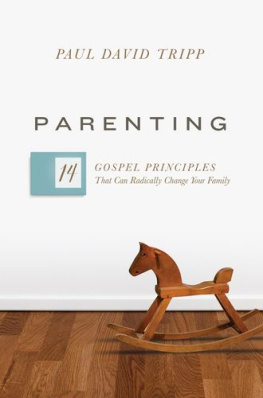Table of Contents
Landmarks
Years ago I experienced a moment of tender, life-changing grace. It changed me and the trajectory of my life. With a thankful heart, I have relived that moment again and again, wondering what I would be, where I would be, and what I would be doing without this moment of gracious interruption. I was proud and immature, and I had done many things wrong, but the onslaught of criticism and the questions of my character and qualifications had left me beaten, bruised, discouraged, and defensive. All I wanted to do was run, and I had made concrete plans to do so. But a bountifully loving God sent a tender loving man to interrupt my depressing private conversation with words of grace. I was in the wrong; words of rebuke would have been appropriate, but they would not have rescued me. I would have received them as just another verbal beating. What melted my heart and changed my life was grace, poured out in patient words of forgiveness and love.
I was confronted that day by a truth I have given my life to write and speak about: that God makes his invisible grace visible by sending people of grace to give grace to people who need grace . Grace is the most powerful force of transformation in the universe. It has the power to turn liars into truth tellers. It can turn the proud into the humble. It transforms heretics into biblical scholars. It makes selfish people loving and materialistic people generous. It turns rebellious men and women into those who willingly and faithfully obey. It gives sight to blind eyes and causes spiritually deaf people to hear. It reconciles shattered relationships and puts love where hatred once was. It alone has the power to make spiritually dead people to live again. It causes glory-obsessed people to live for the glory of another. It makes comfort-focused people willing to live sacrificially. It puts courage where fear once was, hope where despair lived, and peace where war once raged. It turns idolatry into worship, defeating in the heart what nothing else could ever defeat. The incalculable transforming power of grace should never be minimized or doubted.
As I scan my Twitter feed each day, I wonder if we have functionally lost confidence in the grace that stills lives at the very center of our theology. It seems as though we are placing our hope in another set of tools. If you are trying to fix something in your home and after some effort you drop the tool you are using and pick up another tool, you are doing so because you dont think the tool you have been using is capable of getting the job done. The social media landscape is often seriously lacking in grace. It causes me to think often about the words of 2 Corinthians 10, where the apostle Paul explains that the weapons we fight with are not the weapons of the world. But on social media, we are fighting with the weapons of the world. Although the topics may differ, often the toxic reactivity of Christian social media does not look much different from its secular counterpart. Perhaps our willingness to use the worlds weapons reveals a functional lack of confidence in the rescuing and change-producing power of Gods grace. In life we all tend to pick up the tool that we think will get the job done.
It should get our attention that the Bible doesnt tell us that the anger of God is what leads people to repentance. For all the gargantuan ferocity of the righteous anger of God against sin, it is his goodness that causes us to listen, to hear, to believe, to confess, and to repent (Rom. 2:4). Mercy triumphs over judgment. When it comes to the way we disagree with one another, debate issues, and respond to concerns, I wonder if we have forgotten the very theology we think we are defending. When you abandon a functional belief in the power of transforming grace, you give room for the toxicity of sin, which still resides in your heart, to shape your reactions to others; cruelty replaces kindness, harshness replaces gentleness, mockery replaces respect, vengeance replaces mercy, hate replaces love, dismissal replaces forgiveness, war-making replaces peacemaking, tribalism replaces a commitment to unity, defensiveness replaces humble approachability, and functional hatred replaces patient love.
This chapter is a call to recommit ourselves to a lifestyle of grace, no matter when, no matter where, no matter about what, and no matter who. Grace is more than a means of attaining a relationship with God and a promise of an eternity with him. Grace is also a welcome to a brand-new way of living. Grace welcomes us to humbly admit our limits and to humbly answer Gods call. The theology of grace that splashes across the pages of Scripture is deeply humbling. It requires me to admit that I am not capable of the deepest, most necessary kind of change, that I am a person in need of divine rescue. It also requires me to admit that I have independent power to change no one. If I had the power to fundamentally change another person by the force of my anger, by the power of my logic, or by guilt, shame, or fear, then the life, death, and resurrection of Jesus would not have been necessary. Change at the level of the human heart is always an act of Gods grace.
Yes, God uses instruments. Thats why we believe in the proclamation of the gospel, in biblical discipleship, in confronting error, in defending biblical truth, in honest discussion and debate, and in teaching, preaching, and counseling. But the vital question we must always ask is, What is God doing in this moment and how can I be part of it? Its not about what has made me angry, what I think of the other person, what I want from this moment, what I think of this other tribe, or how I want to be viewed. I am never on center stage; God is. My will is never paramount; Gods will is. My hopes and dreams are never the controlling factor; Gods plan, purpose, and call are. A culture of grace is about recognizing that God is working out his plan, doing what I could never do, right here, right now, and calling me to be part of it. The theology of Gods grace always gives me a higher, grander purpose for my responses than I would otherwise have. Submitting my words to that higher purpose frees me from the reactive toxicity that is so personally and communally destructive.
Gods Way of Grace
The Bible is replete with calls for us to commit ourselves to a lifestyle of grace: Forgive as God has forgiven you; Love one another, as I have loved you; Be merciful, even as your Father is merciful(see Eph. 4:32; John 13:34; Luke 6:36). So, it is important to consider what this lifestyle of grace looks like and how it will shape the way we react and respond to one another. There is no better place to go for a description of a lifestyle of grace than Galatians 5. Paul contrasts this lifestyle, which is made possible only by the heart-transforming grace of the Holy Spirit, with the destructive toxicity of sin. Now the works of the flesh are evident: sexual immorality, impurity, sensuality, idolatry, sorcery, enmity, strife, jealousy, fits of anger, rivalries, dissensions, divisions, envy, drunkenness, orgies, and things like these (Gal. 5:1921). Paul puts enmity, strife, jealousy, fits of anger, rivalries, dissensions, and envy right up there with sexual immorality and sorcery as unfruitful works of darkness. It should be sobering to us that while we decry the sexual immorality of the surrounding culture, we have permitted into our Christian social media culture many of the things that the Bible names as the works of the flesh. These things, according to Paul, are an alien culture to the culture of the kingdom of God. So they have no place in shaping the way we react to one another, no matter what the issue is or to whom we are responding.
Then in the verses that follow, Gods way of grace is laid out for us: But the fruit of the Spirit is love, joy, peace, patience, kindness, goodness, faithfulness, gentleness, self-control (Gal. 5: 2223). I call this list Gods way of grace because these character qualities are made possible only by divine grace. I have no ability whatsoever to turn myself into the kind of person described by this list. This is why we often refer to this list of character qualities as the fruit of the Spirit.














